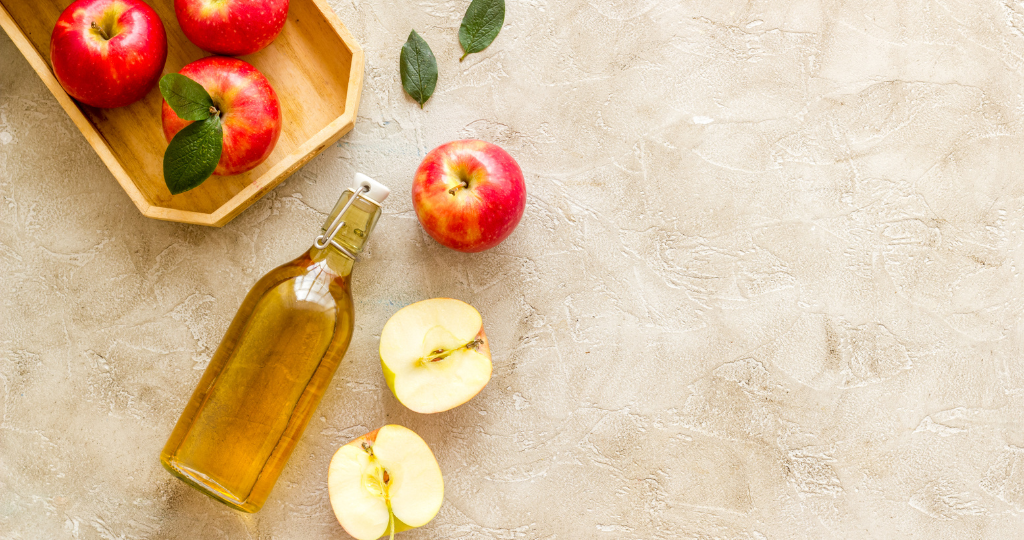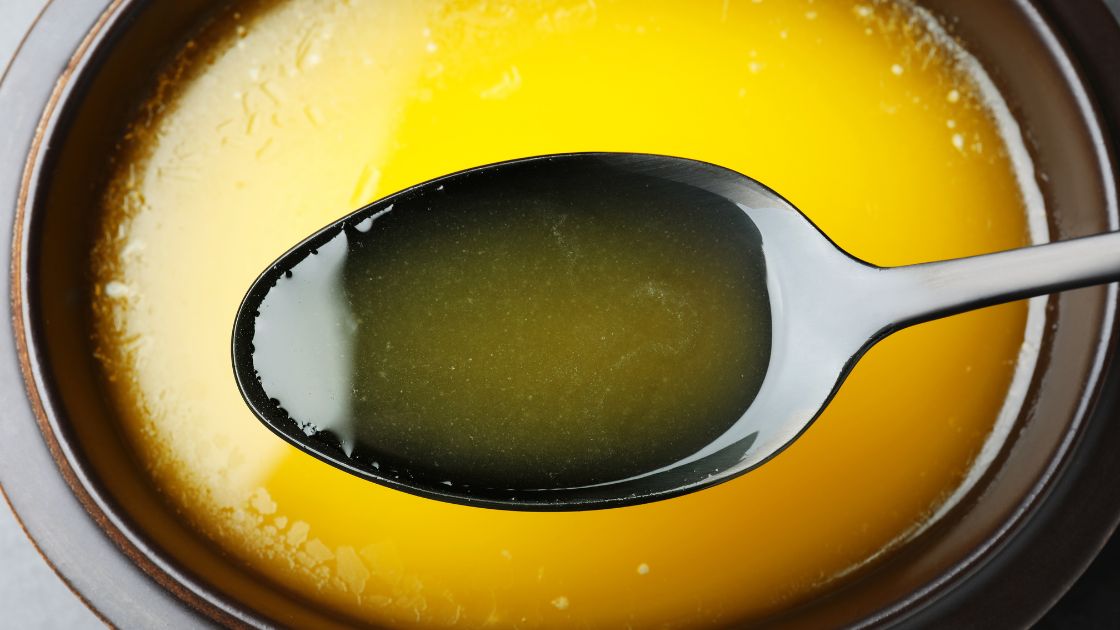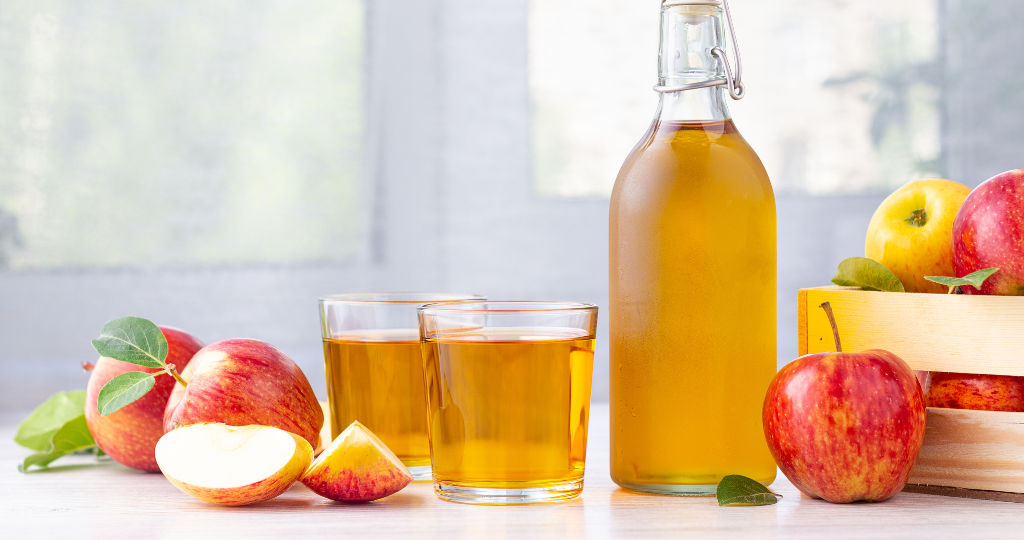
From Sweet to Tangy: Exploring Apple Cider and Apple Cider Vinegar
There are two distinct products made from apples. These are apple cider and apple cider vinegar. These two things are often interchangeably used. Each has its own characteristics and features despite their similar origin. Apple cider is made by juicing and pressing apples and then collecting the juices.
The vinegar version is made from this fluid and fermenting it two times. One time leads to the formation of alcohol. The second time, turn the alcohol into vinegar. Both versions have various health benefits and uses. This article explores the same for your ease.
Comparing apple cider and apple cider vinegar
Let's first examine the fundamental distinctions between apple cider and apple cider vinegar before getting into the details. A drink made from crushed apples, apple cider, is frequently connected to autumn customs like cider pressing and apple picking. Usually unfiltered, it can be savoured hot or cold and occasionally flavoured with other spices like cinnamon. Conversely, apple cider vinegar is a byproduct of a two-step fermentation process that starts with apple cider. This vinegar is a popular choice for both culinary and medicinal applications because of its tart flavour and many health advantages.
|
Parameters |
Apple Cider |
Apple Cider Vinegar |
|
Origin |
Apples |
Apple Cider |
|
Taste |
Sweet, Fruity |
Tangy, Acidic |
|
Colour |
Clear or Clouded if unfiltered |
Golden brown or deep amber |
|
pH Level |
Inspecting the differences
The differences between apple cider and apple cider vinegar can be witnessed right from their manufacturing to their uses. Each of the points of distinction is detailed below.
Manufacturing
Newly pressed apples are used to make apple cider. Apple cider is the juice that is extracted from pressing without any filtration or sweeteners added. The taste is simply so much more genuine and natural. However, if you were raised drinking apple juice, you may need to develop a taste for apple cider as there is a noticeable difference in taste.
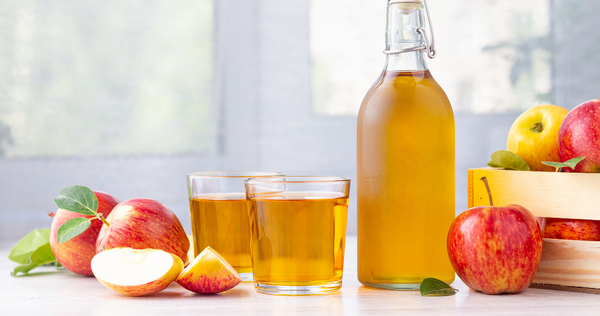
Like regular vinegar, apple cider vinegar is manufactured with apple cider instead of another fruit juice or wine. After making apple cider, the fermentation process is initiated by adding a starter known as a mother. The apple cider's sugars are fermented once to produce alcohol, then fermented again to produce acetic acid. Acetic acid and malic acid are the two primary acidic ingredients in ACV. The taste is distinctly sour due to these two acids.
Flavour
Apple cider's sweet, crisp flavour is often associated with just-picked apples. It frequently has mildly tangy undertones, particularly in unfiltered types with more apple solids. Some cider makers further enhance the flavour of their product by adding spices like nutmeg, cloves, or cinnamon. This results in a warm, cosy drink ideal for cold nights.
Apple cider vinegar, on the other hand, tastes very tangy, harsh and acidic. The fermentation process that turns the carbohydrates into acetic acid gives it a flavour that differs from apple cider. Although some individuals find apple cider vinegar's strong flavour appealing in food preparation, others might find it too strong to drink alone. On the other hand, apple cider vinegar may give a distinctive pop to various dishes when diluted with water or used in marinades and sauces.
Nutritional content
The table below illustrates the nutritional differences between apple cider and cider vinegar. It is given based on a 1 cup (239 g) measurement and findings from the USDA.
|
Apple Cider |
Apple Cider Vinegar |
|
|
Calories |
120 |
51 |
|
Total fat |
0.3g |
0g |
|
Sodium |
9.6mg |
12mg |
|
Potassium |
241mg |
174.5mg |
|
Carbohydrate |
28g |
2.2mg |
|
Protein |
0.3g |
0g |
|
Iron |
3% |
2% |
|
Magnesium |
12.4 mg |
3% |
Health benefits
Apple cider is rich in antioxidants, vitamins, and minerals naturally present in apples. It's a healthier option than sugar-filled drinks like soda because it provides nutrition and water simultaneously. Additionally, some research indicates that consuming apple cider in moderation may help with blood sugar balance and digestive health.
On the other hand, apple cider vinegar has become more well-known for its many health benefits. It's thought to help regulate weight by encouraging fullness and lowering blood sugar surges following meals. Another everyday use for apple cider vinegar is as a home treatment for digestive problems like indigestion and bloating. It is also a well-liked option for cleaning and disinfecting due to its antibacterial qualities. You can check Zandu’s range of apple cider vinegars for the best quality organic apple cider vinegar.
Uses of apple cider
Besides drinking and making cider vinegar, apple cider can be used in the following ways.
- Cooking: Apple cider is an adaptable element in culinary arts. It can make sauces, marinades, glazes, and dressings. It gives food, particularly those with pork, poultry, or vegetables, a naturally occurring sweetness and richness of flavour.
- Baking: Apple cider significantly improves the flavour and moisture content of bread, cakes, and muffins, mainly in recipes that include apples or other fall spices.
- Brining: Apple cider makes a great brine before cooking meats. Its flavour and acidity impart a subtle sweetness to the meat while tenderising it.
- Health tonic: Apple cider is sometimes marketed as a health tonic by those who think it will improve immunity, facilitate digestion, and enhance general well-being. Despite the lack of scientific data to support this claim, apple cider does include health-promoting minerals and antioxidants.
- Fruit preserving: Apple cider can preserve fruits such as apples, pears, and peaches. It preserves their flavour and freshness, particularly when preparing jams or compotes.
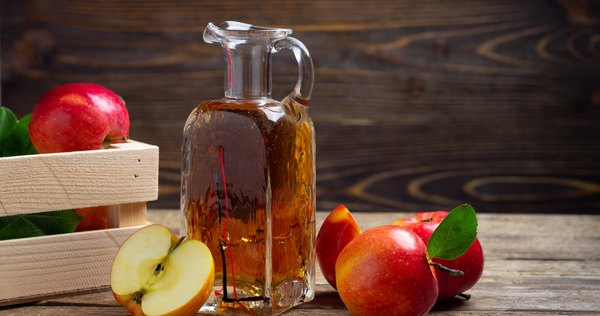
Uses of apple cider vinegar
Apple cider vinegar, commonly called ACV, is a flexible product that may be used in culinary and non-culinary applications due to its wide variety of uses and advantages. Here are a few typical and inventive applications for apple cider vinegar.
- Dressings for salads: Apple cider vinegar gives vinaigrettes, marinades, and salad dressings a zesty taste. When combined with olive oil, honey, mustard, herbs, and spices, it enhances the flavour of salads, grilled meats, and vegetables.
- Digestive aid: Some people drink a little bit of apple cider vinegar mixed with water before they eat. They think it helps them digest their food better. Apple cider vinegar might increase the amount of acid in the stomach. This can be helpful for people who don't have enough stomach acid.
- Hair rinse: Apple cider vinegar (ACV) is a well-liked natural hair rinse because of its reputation for balancing the pH of the scalp and hair. Diluted apple cider vinegar (ACV) can help clear buildup, improve lustre, and support better hair and scalp health.
- Skin toner: Apple cider vinegar, when diluted with water, is a natural skin toner. It helps constrict pores, regulate the skin's pH, and lessen oiliness, especially for oily or acne-prone skin types. Check other ACV skin benefits.
- Sore throat relief: Because apple cider vinegar has antimicrobial qualities, gargling with diluted vinegar might help relieve sore throats. It can also help calm discomfort and lower throat inflammation.
- Weight control: Some people think that taking apple cider vinegar before meals can help with weight management by increasing feelings of fullness and lowering hunger. However, more investigation is needed to validate these assertions.
- Deodorant: When combined with essential oils, apple cider vinegar (ACV) can be used as a natural deodoriser for shoes, clothing, and even household air fresheners.
What to choose?
The choice between apple cider and vinegar depends on your needs. Each offers ample health and ancillary advantages. While ACV is more diverse, offering health, skincare, and haircare advantages, the uses of apple cider are mostly related to cooking and food-related processes. While purchasing, check the package properly since these two are often confused as one thing.
Also check:
Conclusion
Two different products are made from apples: apple cider and apple cider vinegar. Each has unique qualities and advantages of its own. Both products can be included in a balanced diet when consumed in moderation, whether you prefer to drink cold apple cider or use apple cider vinegar in recipes and wellness routines. Knowing the distinctions between apple cider and apple cider vinegar enables you to choose wisely depending on your tastes and health objectives.
Frequently asked question
1. Are apple cider and apple cider vinegar the same thing?
No. These two things are pretty different and have different uses and benefits.
2. Can I use apple cider vinegar instead of apple cider?
Apple cider and apple cider vinegar are very different. They have different tastes, acidities, and uses. Hence, do not substitute one for the other, as this will affect the outcomes.
3. Is apple cider good for health?
Apple cider is often used as a health tonic. Since it is derived from apples, it bears many of the fruit's properties.
4. Is apple cider vinegar the same as vinegar?
Although the composition might be similar to vinegar, apple cider is a fruit-based vinegar with lower acetic acid.
5. Can ACV be taken every day?
It is recommended to consume ACV of1-2 tbsp every day. However, it is always better to consult medical professionals if any health condition or food allergies present.




